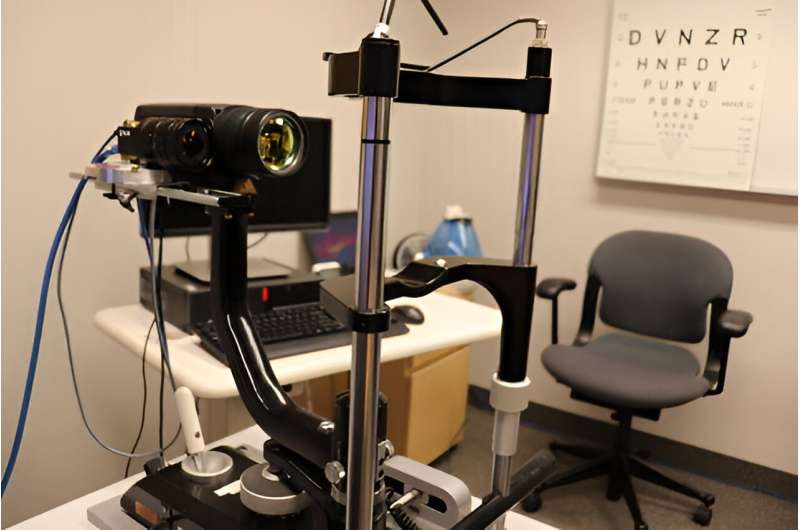This article has been reviewed according to Science X's editorial process and policies. Editors have highlighted the following attributes while ensuring the content's credibility:
fact-checked
peer-reviewed publication
trusted source
proofread
Novel device aims to use thermal imaging of the ocular surface to screen for conditions such as dry eye disease

Taking your temperature can often help a health care practitioner figure out if you're sick. A new University of Waterloo spinoff company aims to do something similar with your eyes.
ThermOcular AI, a company started by Waterloo vision science and engineering researchers, aims to bring a patented thermal imaging system to market that can measure in detail the temperature of the cornea, the transparent part of the eye that domes over the iris and pupil. The novel device could be used to screen for dry eye and potentially other ocular diseases.
A study outlining the researchers' work was published in IEEE Access.
"If you have a fever, it's likely an indication of an infection causing inflammation," said Dr. Paul Murphy, a professor at the School of Optometry & Vision Science and chief scientific officer of ThermOcular AI. "If you have inflammation in the eye, it can increase blood flow, so we figured temperature might indicate disease in the eye too."
Dry eye is a common condition that can be debilitating. Some patients don't produce enough tears to keep their eyes lubricated. Others don't have a well-functioning lipid layer in their tears, so their tears evaporate too fast, causing an itchy or gritty eye.
Most dry eye symptoms can be treated with lubricating eyedrops or warm compresses. However, severe dry eye disease can lead to eye inflammation, corneal scarring and sometimes vision loss. Even people with mild to moderate chronic dry eye can have trouble with tasks such as reading or working at a computer screen.
ThermOcular AI aims to provide quick, non-invasive imaging of the eye that will tell clinicians whether a patient's ocular temperature patterns are consistent with dry eye by taking a short video of a patient's eye and recording the pattern of how the ocular surface temperature changes over time. That will indicate whether the patient is likely to have dry eye. The tool could possibly be used to diagnose other ocular surface diseases in the future.
Postdoctoral fellow and ThermOcular AI CEO Dr. Ehsan Zare Bidaki, has been working on measuring eye temperature since he started his Ph.D. in 2017 under the joint supervision of Murphy and Dr. Alexander Wong, a Waterloo systems design engineering professor.
"It would be a quick screening test for patients, compared to other tests that might take an hour," said Zare Bidaki of the device. "A clinician would still be involved to decide next steps."
ThermOcular AI was incorporated as a company in January 2024. The founders have been working with Velocity, Waterloo's startup incubator, since 2022 to get help with product-market fit, sales traction and founder network support as they shift their focus from research to entrepreneurship.
Zare Bidaki says their company could benefit patients who typically avoid treatment due to the high cost of specialized eye exams.
"This will be a much more affordable method that will lead to their being able to use the specific medication that will help most for their type of disease. I think this company will help people lead healthier lives," he said.
More information: Ehsan Zare Bidaki et al, A Novel System for Ocular Surface Temperature Measurement and Tracking, IEEE Access (2023). DOI: 10.1109/ACCESS.2023.3341354



















